Excitotoxins are amino acids (or less common amino acid analogues) which function as excitatory neurotransmitters in the nervous system (“excito”), but which also can over-excite a neuron to the point that it dies (“toxin”). Exposure to dietary excitotoxins may lead to abnormal excitatory neurotransmission in a sub-set of the population, called excitotoxicity, which has been implicated in many neurological and psychiatric conditions. Excitotoxicity can also cause oxidative stress and neuroinflammation, and this “neurotoxic triad” has been shown to be self-perpetuating, increasing the damage inside of the nervous system.
Contact Us
Nutritional Neuroscience Lab
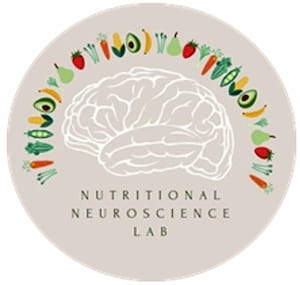
The Nutritional Neuroscience Lab is working to understand the impact of food and food additives on neurological and psychiatric disorders. A primary aim of our research is to understand the negative impact of dietary excitotoxins on neurological function. Excessive glutamatergic neurotransmission can lead to a state of excitotoxicity in the nervous system, which perpetuates oxidative stress and inflammation, in addition to potentially killing neurons. We are also interested in the positive protective effects of micronutrients and antioxidants in protecting against excitotoxicity, oxidative stress and neuroinflammation. This “neurotoxic triad” is self-perpetuating, and diet may be one of the strongest treatments to prevent downstream neurological damage since it can affect all three parts of the triad.
Our lab conducts clinical trials to examine how reduced consumption of dietary excitotoxins, combined with increased consumption of specific micronutrients and antioxidants, can lead to reduced neurological symptoms. We are especially interested in widespread chronic pain disorders, which tend to co-present with other neurological symptoms such as migraine, centrally mediated fatigue, cognitive dysfunction (including memory loss and inattention), sleep issues, psychiatric disorders like depression/anxiety/PTSD, and sometimes seizures and/or gastrointestinal dysfunction.
Current Studies
Please see our Research Studies page to review or participate in our projects:
We began recruitment in fall 2022 for a large multi-site confirmatory clinical trial testing a dietary intervention as a treatment for Gulf War Illness. If you served in the 1990-1991 Gulf War and are currently experiencing widespread symptoms, you may be eligible for this study. Please reach out to us at nutrneurolab@american.edu if you would like to be screened for the study.
The most common exposure to dietary excitotoxins comes from the use of free amino acids as food additives. The most well-known food additives in this class are monosodium glutamate (MSG) and aspartame (which is a dipeptide of phenylalanine and aspartate), though there are many others hidden under various names on food labels. Any food which contains free forms of glutamate, aspartate, or L-cysteine, has the potential to elicit symptoms in sensitive individuals; and there are also a few foods which naturally contain higher levels of these amino acids. Extremely potent glutamate analogs also exist in the environment, and sometimes show up in our food, but exposure to these chemicals is not as common.
Our lab is striving to advance the understanding of dietary influences on excitotoxicity. Dysregulation of glutamatergic neurotransmission has been implicated in many disorders including: Alzheimer's, Parkinson’s, multiple sclerosis, epilepsy, widespread chronic pain (including fibromyalgia and Gulf War Illness), migraine, depression, anxiety, obsessive compulsive disorder, PTSD, and others. Thus, the mission of our lab is to elucidate the potential impact of dietary excitotoxins on neurological/psychiatric symptoms, as well as the positive protective effects of specific dietary components including micronutrients, antioxidants, and omega-3 fatty acids.
Current Study
We have just finished recruiting 40 veterans from around the US for our current Gulf War Illness (GWI) study funded by the Department of Defense. This study is evaluating whether a low glutamate diet can be used as an effective treatment for the chronic symptoms of GWI including widespread chronic pain, headache/migraine, cognitive dysfunction, mood dysregulation, sleep issues, and gastrointestinal symptoms. The data collected is being cleaned and analyzed, and the first publications from this research are expected in Summer 2020. If you are a Gulf War veteran who missed out on participating in this clinical trial, but are interested in future GWI clinical trials, please call or email the lab so you can be added to our wait-list.
Upcoming Studies
We are recruiting for an upcoming clinical trial that will assess the effectiveness of a low glutamate diet for pediatric refractory epilepsy. Glutamate is found in the diet as a flavor enhancer; and is also an important neurotransmitter in the body which mediates seizure activity. The low glutamate diet is balanced, nutritious and palatable, with no side effects. Additionally, the diet provides all nutrients necessary for optimal growth and development, as well as optimal brain function. The study is investigating if following the low glutamate diet for 1 month can improve seizure frequency, severity, and duration; cognitive functioning; and/or quality of life, in children with epilepsy. We will also be looking at changes in brain wave activity. Participation in the study will include 2 visits to the Nutritional Neuroscience Lab at American University over a 2- or 3- month study period, depending on group randomization. Eligible participants include children who are 4-18 years of age, who are experiencing at least 1 seizure per week, have had unsuccessful seizure control with 2 or more anti-epileptic drugs, are orally fed, and do not have inborn errors of metabolism.
If you would like more information or to see if your child may qualify to participate in this study, please call or email the Nutritional Neuroscience Lab with the following information:
- The study you are interested in (epilepsy study)
- Name
- Phone number
- Email address
Contact
Dr. Kathleen Holton, Director
202-885-6099
nutrneurolab@american.edu
Asbury 306
Selected Publications & Talks
Peer Reviewed Publications
Brandley ET*, Kirkland AE, Baron M, Baraniuk JN, Holton KF. The Effect of the Low Glutamate Diet on the Reduction of Psychiatric Symptoms in Veterans with Gulf War Illness: A Pilot Randomized Controlled Trial. Frontiers in Psychiatry. In press May 2022.
Kirkland AE*, Langan MT, Holton KF. Artificial Food Coloring Affects EEG Power and ADHD Symptoms in College Students with ADHD: A Pilot Study. Nutritional Neuroscience. 2022 Jan; 25(1): 159-168. Epub Mar 2020. https://doi.org/10.1080/1028415X.2020.1730614
Sarlo GL*, Holton KF. Caregiver Perspectives on Dietary Therapies for Epilepsy. Epilepsy Research. 178. Nov 2021. https://doi.org/10.1016/j.eplepsyres.2021.106803
Holton KF. Micronutrients May Be a Unique Weapon Against the Neurotoxic Triad of Excitotoxicity, Oxidative Stress and Neuroinflammation: A Perspective. Frontiers in Neuroscience, section Neuroenergetics, Nutrition and Brain Health. 2021 Sep;15:726457. https://doi.org/10.3389/fnins.2021.726457
Holton KF, Ramachandra SS*, Baraniuk JN. Effect of the Low Glutamate Diet on Inflammatory Cytokines in Veterans with Gulf War Illness (GWI). Life Sciences. Sep 2021;280. DOI: 10.1016/j.lfs.2021.119637
Murray SL*, Holton KF. Post-traumatic stress disorder may set the neurobiological stage for eating disorders: A focus on glutamatergic dysfunction. Appetite. 167. 2021 Dec 1;167:105599. Epub July 2021. https://doi.org/10.1016/j.appet.2021.105599
Kirkland AE*, Baron ML, VanMeter JW, Baraniuk JN, Holton KF. The Low Glutamate Diet Improves Cognitive Functioning in Veterans with Gulf War Illness and Resting-State EEG Potentially Predicts Response. Nutritional Neuroscience. 2021 Jul;1-12. DOI: 10.1080/1028415X.2021.1954292
Sarlo GL*, Holton KF. Brain concentrations of glutamate in human epilepsy: A review. Seizure: European Journal of Epilepsy. 2021 Oct;91:213-227. Epub Jun 2021. DOI: https://doi.org/10.1016/j.seizure.2021.06.028
Sarlo GL*, Kao A, Holton KF. Optimization of data collection in Dietary Therapy Clinics for Epilepsy. Epilepsy Research. Oct 2020. 168:106488. https://doi.org/10.1016/j.eplepsyres.2020.106488
Holton KF, Kirkland AE, Baron M, Ramachandra SS, Langan MT, Brandley ET, Baraniuk JN. The low glutamate diet effectively improves pain and other symptoms of Gulf War Illness. Nutrients. 2020.12(9):2593.
Fifi AC and Holton KF. Food in Chronic Pain: Friend or Foe? Nutrients. 2020.12(8):2473.
Joyce M, Holton KF. Neurotoxicity in Gulf War Illness and the Potential Role of Glutamate. Neurotoxicology. 80:60-70.
Kirkland AE, Holton KF. Artificial Food Coloring Affects EEG Power and ADHD Symptoms in College Students with ADHD: A Pilot Study. Nutritional Neuroscience.
Brandley, ET, & Holton, KF. Breakfast positively impacts cognitive function in college students with and without ADHD. American Journal of Health Promotion. In Press Jan 2020.
Holton KF, Kirkland AE. Moving past antioxidant supplementation for dietary treatment of multiple sclerosis. Multiple Sclerosis Journal. In Press.
Holton KF, Hargrave S, Davidson TL. Differential Effects of Dietary MSG on Hippocampal Dependent Memory Are Mediated by Diet. Front Neurosci. Sept 2019.
Kirkland AE, Holton KF. Measuring treatment response in pharmacological and lifestyle interventions using electroencephalography (EEG) in ADHD: A review. Clinical EEG and Neuroscience. 2019 Jan.
Kirkland AE, Sarlo GL, Holton KF. The Role of Magnesium in Neurological Disorders.Nutrients 2018 Jun; 10(6):730.
Holton KF, Ndege PK, Clauw DJ. Dietary correlates of widespread chronic pain in Meru, Kenya. Nutrition. 2018 Feb; 53:14-19.
Holton KF, Cotter EW. Could dietary glutamate be contributing to symptoms of Obsessive-Compulsive Disorder? Future Science OA. 2018 Jan; 4(3):FSO277.
Holton KF, Johnstone JM, Brandley ET, Nigg JT. Evaluation of Dietary Intake in Children and College Students with and without Attention-Deficit/Hyperactivity Disorder. Nutr Neuroscience. 2018 Jan; 23:1-14.
Presentations
- Poster presentation (student) at the online American Society for Nutrition conference June 14-16th, 2022 titled, “Nutrient Intake as a Predictor of Health Improvement on the Low Glutamate Diet in Veterans with Gulf War Illness (GWI)”
- Poster presentation (student) at the Southeastern Psychological Association conference titled, “The Low Glutamate Diet Improves Post Traumatic Stress Disorder (PTSD) Symptoms and Normalizes Cortisol in Veterans with Gulf War Illness” in Hilton Head, SC, Mar 23-26, 2022.
- Poster presentation (student) at Society for Neuroscience in Chicago, IL Nov 13-16, 2021, titled, “The low glutamate diet improves working memory performance and alters functional connectivity within pertinent networks in veterans with Gulf War Illness.”
- Poster presentation (student) titled, “Caregiver Perspectives on Dietary Therapies for Epilepsy” presented at the 7th Global Symposium on Medical Ketogenic Dietary Therapies in Brighton, UK Oct 19-22, 2021.
- Oral presentation to the Research Advisory Committee on Gulf War Illness (online) March 10th, 2021, titled “The Low Glutamate Diet as a Treatment for GWI.”
- Oral presentation at the GWI State of the Science Conference (online) Aug 18-19th, 2020, titled “The low glutamate diet effectively improves overall symptom load, pain, and fatigue in veterans with GWI.”
- Oral and poster presentation (student) at the American Epilepsy Society conference in Baltimore, MD Dec 6-10, 2019 titled, “Optimization of Data Collection for Clinics Specializing in Dietary Therapies for Epilepsy”
- Poster presentation (student) at the International Conference on ADHD in Philadelphia, PA Nov. 6-9, 2019 titled, “Artificial Food Coloring Affects Brain Wave Activity in College Students with ADHD”
- Oral presentation at the International Society for Nutritional Psychiatry Research in London, England Oct 20-22, 2019 titled, “A Low Glutamate Diet Reduces Anxiety and PTSD Symptoms in Veterans with Gulf War Illness”
- Poster presentation (student) at the International Society for Nutritional Psychiatry Research in London, England Oct 20-22, 2019 titled, “The Effects of a Low Glutamate Diet on Depression in Gulf War Veterans”
- Symposium presentation at the International Society for Nutritional Psychiatry Research in London, England Oct 20-22, 2019 titled, “Micronutrients for Mental Illness”
- Symposium presentation at the International Society for Research on Child Psychopathology in Los Angeles, CA June 26-29, 2019 titled, “Broad Spectrum Micronutrient Treatment for Children with ADHD and Irritable Mood: Why, How, Results, and Future Directions”
- Oral and poster presentation (student) at the American Society for Nutrition conference in Baltimore, MD June 8-11, 2019 titled, “The Effects of a Low Glutamate Dietary Intervention on Anxiety and PTSD in Veterans with Gulf War Illness”
- Poster presentation (student) at the American Society for Nutrition conference in Baltimore, MD June 8-11, 2019 titled, “The Effects of a Low Glutamate Dietary Intervention on Anxiety and PTSD in Veterans with Gulf War Illness”
- Poster presentation (student) at the American Society for Nutrition conference in Baltimore, MD June 8-11, 2019 titled, “Intake of Aspartate and Glycine is Negatively Associated with Cognitive Functioning in College Students”
- Poster presentation (student) at the Society for Research on Child Development Biennial Meeting in Austin, TX April 6-8, 2017 titled, “The effects of breakfast on cognitive function in college students with and without ADHD”
News
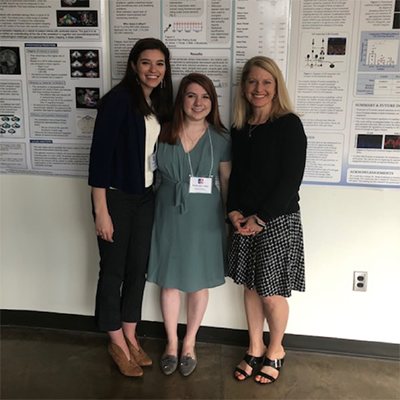
Poster presentation at the 2019 AU Research Conference in Washington, DC.

Lab members at the 2019 International Society for Nutritional Psychiatry Research in London.
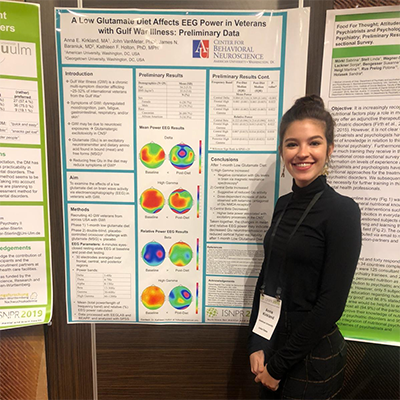
Poster Presentation at the 2019 International Society for Nutritional Psychiatry Research meeting held in London.
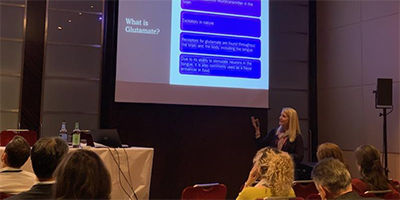
Symposium presentation at the International Society for Nutritional Psychiatry Research in London, England Oct 20-22, 2019 titled, “Micronutrients for Mental Illness”.
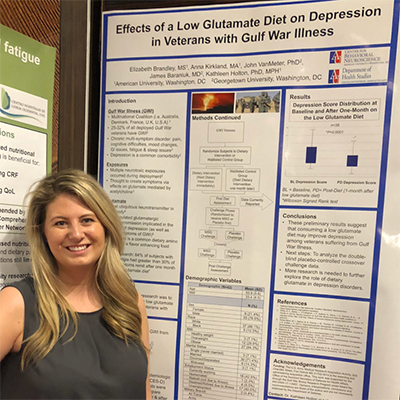
Presentating at 2019 International Society for Nutritional Psychiatry Research meeting.

At the 2019 International Society for Nutritional Psychiatry Research meeting in London.
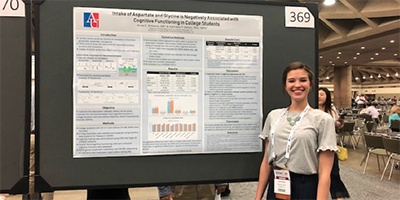
Poster presentation at the 2019 American Society for Nutrition Conference in Baltimore, MD.
